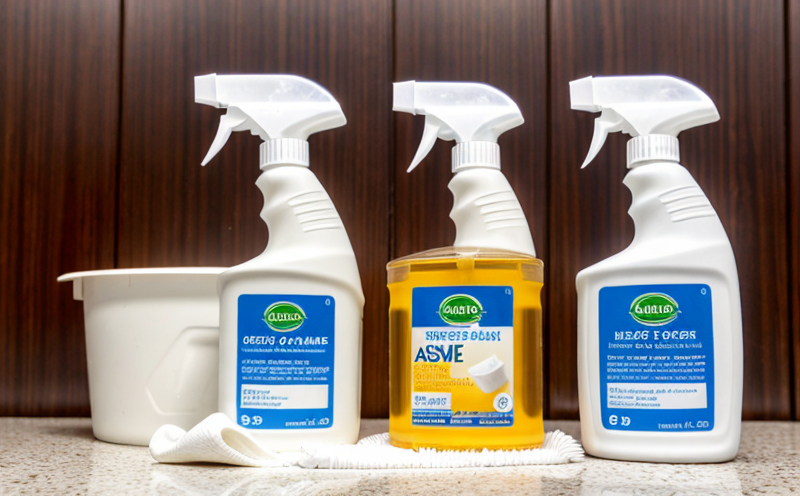EN 13610 Bacteriophage Testing of Hygiene Products
The EN 13610 standard is a European Union regulation that provides the method for testing hygiene products to ensure they do not support bacterial growth. Specifically, this test evaluates the resistance of hygiene products against bacteriophages—viruses that infect bacteria. This is crucial in ensuring that hygiene products do not become vehicles for pathogenic microorganisms, thereby protecting public health.
The standard is particularly relevant for a wide range of personal care and household products such as soaps, shampoos, hand sanitizers, and cleaning agents. The testing process involves exposing the product to bacteriophages under controlled conditions and then checking if any viable bacteria remain after incubation periods. Failure in this test can indicate that the product could potentially support bacterial growth, which is undesirable.
For quality managers and compliance officers, understanding the nuances of EN 13610 testing helps ensure their products meet regulatory requirements. Compliance with such standards demonstrates a commitment to producing safe and effective hygiene products. R&D engineers benefit from this test as it informs them about product formulation adjustments that might enhance its bacteriophage resistance. Procurement professionals can leverage this information to source suppliers who adhere strictly to these regulations.
The testing process involves several steps, each designed to ensure accuracy and reliability of results:
- Sample preparation: Hygiene products are prepared according to the standard's specifications to ensure uniformity in testing.
- Application: Bacteriophages are applied to the samples following prescribed protocols to simulate real-world conditions.
- Incubation: Samples are incubated under controlled environmental conditions to allow for any potential bacterial growth.
- Assessment: The presence or absence of viable bacteria is assessed using appropriate microbiological methods.
The results of the EN 13610 test are critical for ensuring hygiene products do not support bacterial growth, thus protecting public health. Compliance with this standard enhances brand reputation and consumer trust, leading to increased market share and customer loyalty.
| Sample Type | Bacteriophage Strain | Incubation Time | Assessment Method |
|---|---|---|---|
| Solution-based products | M13 phage | 24 hours at 37°C | Viable bacterial colonies counted |
| Solid products | Bacteriophage ΦX174 | 48 hours at 30°C | PCR detection of bacterial DNA |
The reliability and accuracy of the EN 13610 test are paramount. Laboratories adhering to this standard use state-of-the-art equipment and trained personnel to ensure consistent results.
Industry Applications
- Cleaning agents: Ensuring products do not support bacterial growth is crucial for maintaining hygiene in commercial spaces.
- Personal care products: Soap and shampoo formulations are tested to prevent bacterial proliferation on skin and hair surfaces.
- Hand sanitizers: These products must effectively inhibit bacteria without introducing harmful microorganisms into the environment.
The EN 13610 test is also applicable in healthcare settings where stringent hygiene protocols are necessary. Hospitals, clinics, and other medical facilities require products that do not support bacterial growth to prevent cross-contamination and infections. By adhering to this standard, manufacturers can ensure their products meet these critical requirements.
Additionally, the test applies to household cleaning products used in kitchens and bathrooms where hygiene is paramount. Ensuring bacteriophage resistance helps maintain a hygienic environment at home, contributing to overall public health.
Why Choose This Test
- Regulatory compliance: Compliance with EN 13610 ensures that products meet EU standards for hygiene product testing.
- Consumer trust: Demonstrating adherence to this standard enhances consumer confidence in the safety and effectiveness of products.
- Innovation: The test provides valuable insights into product formulation adjustments that can enhance bacteriophage resistance.
The EN 13610 test is essential for manufacturers aiming to produce safe, effective, and compliant hygiene products. By choosing this test, companies ensure their products meet the highest standards of safety and efficacy.
Competitive Advantage and Market Impact
- Enhanced consumer trust: Compliance with EN 13610 fosters a reputation for producing safe, effective hygiene products.
- Increased market share: Demonstrating adherence to this standard can differentiate products in the competitive market, attracting more customers.
- Innovation leadership: The test provides insights into improving product formulations, leading to innovative and safer products.
The EN 13610 test is a key differentiator for manufacturers. By ensuring their products meet this stringent standard, companies can maintain a competitive edge in the market, attract more customers, and enhance brand reputation.





